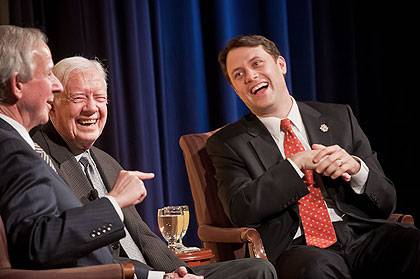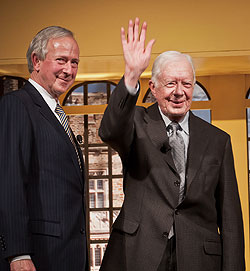The Duke Idea Interview: Former President Jimmy Carter on Crises and Contemporary Politics
At Carter Center, former US president talks with his grandson and President Brodhead

Contemporary political leaders often bemoan the complicated
challenges they face, such as persistent high unemployment, uncertainty in the
Middle East, China's increasing power and volatile oil prices. But former
President Jimmy Carter offered some historic perspective Wednesday night in a
talk for about 450 Duke Alumni and friends at Atlanta's Carter Center.
Carter took office in 1977 when the country still was
reeling from a deep mistrust of public institutions following the Watergate
scandal, ongoing fallout from the conflict in Vietnam, the threat of oil
boycotts by Middle Eastern states, and, most daunting, the ceaseless threat of
nuclear war.
"I never left the fact that in 26 minutes Soviet
missiles could reach New York," Carter said. "I was primarily
concerned in my administration with maintaining peace."
Carter and his grandson, Jason Carter '97, a lawyer and
Georgia state senator, participated in a lively public discussion led by Duke
President Richard Brodhead. The event
was part of The
Duke Idea, a series of conversations Brodhead moderates in cities around
the world. Topics often focus on the public good, and guest speakers joining
Brodhead have ranged from politicians and professors to physicians, athletes
and business leaders.
Questions posed to the Carters touched on their path to
public service, last year's Arab Spring uprisings, divisiveness in contemporary
politics, the future of Iran and Russia and the Occupy movement.
Jimmy Carter recalled the event that propelled him into
public service: the death of his father, a beloved community leader in his rural
Georgia home.
During a trip home for his father's funeral, friends and
neighbors lined up to tell Jimmy, who had a promising career in the Navy
working on nuclear submarines, how much his father had meant to them.
"At the end of that visit I decided to resign from the
Navy," he said. "I immersed myself in public life."
Carter returned home and became a Sunday school teacher, Boy
Scout leader, school board member, and, eventually, a state representative. In
the years that followed he was elected governor and then became the 39th
president of the United States.
Long a proponent of human rights, Carter, along with his
wife, Rosalynn, founded the Carter Center in 1982. The organization focuses on
issues such as disease prevention, peace negotiations, observing elections and education
-- especially in developing nations. Carter also is known as a champion of
Habitat for Humanity, which engages communities to build houses for those in
need.

Jason Carter cited an air of inevitability in his own
journey into public service. In addition to his grandfather's well known-career,
his great grandmother was an early member of the Peace Corps at age 70.
"Her experience in the Peace Corps infected our whole
family," Jason Carter joked.
Jason Carter joined the Peace Corps himself after graduating
from Duke, serving in a rural village in South Africa. There he was struck by
the unfairness of the economic divide between that country's black and white
populations.
Many white people could afford their morning coffee at
Starbucks, he said, while most black people still had to haul water from the
river each day.
"It's a cultural shock on one level," he said.
"It's trying to live in two places at the same time."
The elder Carter said his experiences with Carter Center
opened his eyes to the importance and rightness of addressing need and
inequality around the world. The United States has an obligation to share its
vast wealth with those in need, he said, and people who give should not think
of themselves as better than those they help.
"It dawned on me they were just as intelligent, they
were just as ambitious, and their family values were just as good as
mine," he said. "It's not a matter of superiority or generosity or
handing out gifts to others who are less than you. They just haven't had a
chance in life."
Although Jason Carter
said he was happily surprised by the cooperative spirit of the Georgia
legislature on most issues, both Carters worry about the divisiveness of the
two parties at the national level.
Jimmy Carter recalled a time when politicians referred to
legislators of the opposing party as "my distinguished opponent" and
often were able to collaborate. But today's high-priced campaigns and negative
advertising have turned much of politics into character assassination and
gridlock, he said.
The Carters also agreed that the Occupy movement, though
imperfect, has succeeded in forcing many Americans to consider issues of wealth
disparity and economic unfairness.
"The impact it's had on our discourse is undeniably good,"
said Jason Carter.